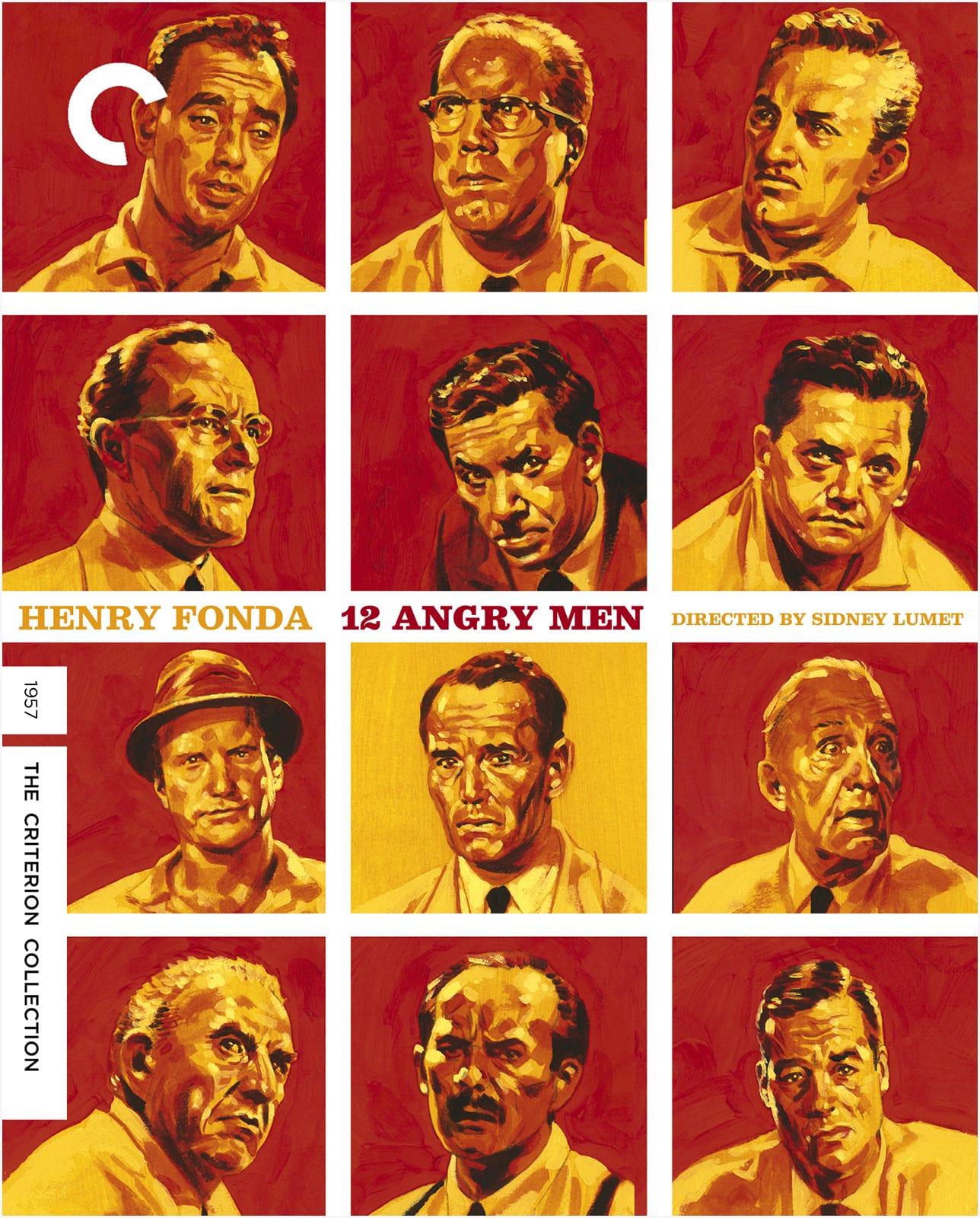


12 Angry Men redefined courtroom drama when it premiered on April 10, 1957, proving that compelling cinema requires neither elaborate sets nor action sequences—only brilliant writing, direction, and performances. This 1-hour and 36-minute drama/crime masterpiece holds an exceptional 9.0/10 IMDb rating from over 950,000 votes, cementing its status as one of the most influential films in cinema history.
Sidney Lumet's directorial debut demonstrated masterful command of confined space storytelling, while Henry Fonda's principled Juror #8 became an icon of moral courage. Watch 12 Angry Men to experience the film that proved intimate character studies could achieve timeless relevance and technical brilliance.
The 12 Angry Men cast features twelve distinct character actors delivering performances that defined their careers within the film's tight 96-minute runtime. Henry Fonda anchors the ensemble as Juror #8, the lone dissenting voice whose reasonable doubt transforms eleven certain verdicts. Fonda's calm, methodical performance embodies rational discourse confronting prejudice and rushed judgment.
Lee J. Cobb delivers a powerhouse performance as Juror #3, the film's antagonist whose personal demons fuel his conviction of the defendant's guilt. The explosive confrontation between Fonda's reason and Cobb's rage provides the narrative's emotional climax across the compact runtime. Ed Begley's Juror #10 represents naked bigotry, while Jack Warden's Juror #7 embodies apathetic cynicism—both obstacles to justice that Juror #8 must overcome.
The supporting cast of 12 Angry Men includes E.G. Marshall as the logical Juror #4, Jack Klugman as the empathetic Juror #5, and Joseph Sweeney as the elderly Juror #9 who first supports Fonda's character. Each actor creates a fully realized individual within minimal screen time, demonstrating ensemble acting at its finest.
Sidney Lumet's directorial debut showcases remarkable technical sophistication for a first-time filmmaker. The director transforms a single jury room into a pressure cooker of tension through meticulous camera work that grows increasingly claustrophobic as deliberations intensify throughout the 96-minute runtime.
Lumet's visual strategy employs increasingly lower camera angles as the film progresses, creating subtle psychological pressure that mirrors the jurors' emotional states. The technique makes the ceiling appear to descend upon the characters, visually representing the mounting tension without explicit dialogue. This sophisticated approach to confined space filmmaking influenced countless subsequent courtroom dramas.
Furthermore, the 12 Angry Men film demonstrates how limitations can inspire creativity. The single-location setting forced Lumet to rely on blocking, performance, and cinematography to maintain visual interest. The result feels intimate rather than restricted, drawing viewers into the deliberation room's moral battleground.
What is 12 Angry Men about extends beyond a simple murder trial verdict. The film examines how personal prejudices, rushed judgments, and social pressures corrupt the justice system's ideals. A teenage defendant faces death penalty conviction for allegedly murdering his father, with twelve jurors holding his fate.
The initial 11-1 guilty vote seems conclusive until Juror #8 requests discussion before condemning a young life. Throughout the 96-minute runtime, the deliberation reveals how each juror's personal experiences, biases, and character flaws influenced their initial verdict. The film demonstrates that true justice requires confronting uncomfortable truths about ourselves and our assumptions.
The movie's exploration of reasonable doubt becomes a masterclass in critical thinking. Juror #8 systematically questions evidence presented as absolute—from witness testimony reliability to the uniqueness of the murder weapon—demonstrating how certainty can mask superficial analysis. This examination of truth versus assumption remains powerfully relevant to contemporary legal and social discourse.
The 12 Angry Men movie achieves technical brilliance through deliberate minimalism. Boris Kaufman's cinematography employs deep focus that keeps all twelve jurors visible simultaneously, creating democratic visual space where each character maintains presence. The black-and-white photography emphasizes the stark moral contrasts underlying the debate.
Kenyon Hopkins' sparse musical score appears only during opening and closing sequences, allowing dialogue and performance to dominate the sonic landscape. This restraint heightens the impact of the jurors' verbal confrontations throughout the runtime, with silence becoming as powerful as speech.
Movie Details:
Henry Fonda 12 Angry Men performance exemplifies understated moral authority. The actor's Juror #8 never raises his voice or claims superior wisdom—instead, he asks questions, presents alternatives, and appeals to conscience. Fonda's restrained approach makes the character's influence more powerful than any passionate speech could achieve.
The role required Fonda to serve as both protagonist and facilitator, allowing other actors their moments while maintaining narrative focus. This generous performance style enabled the ensemble to shine across the compact 96-minute runtime. Fonda's production involvement (he also produced the film) demonstrated his commitment to intelligent, socially conscious cinema.
Moreover, Juror #8's architectural profession subtly reinforces his methodical approach to deconstructing the prosecution's case. Like analyzing building plans, he examines the trial's foundation for structural weaknesses—finding cracks that threaten the entire verdict.
The 12 Angry Men cast creates distinct personalities through minimal backstory exposition. Each juror's character emerges through their deliberation contributions, revealing worldviews, prejudices, and personal struggles. Juror #3's rage stems from estrangement from his own son, projecting family trauma onto the defendant. Juror #5's slum background provides crucial insight into switchblade knife culture.
The film's character work demonstrates how people's experiences shape their perception of truth and justice. Juror #10's explicit racism, Juror #7's baseball game obsession, and Juror #11's immigrant gratitude for American justice all influence their initial verdicts. The deliberation process forces confrontation with these biases throughout the runtime.
This character-driven approach makes the verdict's gradual shift believable. Each juror changes position based on their individual reasoning rather than group pressure, creating authentic dramatic progression across the 96-minute narrative.
Since its release, 12 Angry Men has influenced countless courtroom dramas and become required viewing in law schools worldwide. The film's examination of jury deliberation, reasonable doubt, and justice system flaws maintains relevance across generations and legal systems.
The movie's exploration of how prejudice infiltrates supposedly objective decision-making extends beyond legal contexts. The deliberation room becomes a microcosm of society, where reasoned discourse must combat ingrained biases and rush to judgment. This universal theme ensures the film's continued cultural significance.
Additionally, 12 Angry Men streaming popularity demonstrates how black-and-white classics can captivate modern audiences. The tight screenplay, powerful performances, and moral urgency transcend the film's 1950s setting to address timeless human struggles with fairness and truth.
Where to watch 12 Angry Men options now include numerous streaming platforms offering high-definition viewing quality that honors this cinematic masterpiece. The film's concise 96-minute runtime makes it perfect for focused viewing that showcases Lumet's directorial craftsmanship and the cast's ensemble excellence.
Where can I watch 12 Angry Men through premium IPTV services that provide superior streaming quality. The enhanced viewing experience includes optional commentary tracks exploring the film's production history and lasting influence on legal drama.
Available Viewing Formats:
12 Angry Men 1997 brought the story to television with an updated cast including Jack Lemmon, George C. Scott, and James Gandolfini. The remake modernized certain elements while maintaining the original's structure and themes. While respectable, most critics consider Sidney Lumet's 1957 version superior for its raw intensity and period authenticity.
The 12 Angry Men 1997 cast delivered strong performances, but the remake's color photography and contemporary setting sacrificed some of the original's timeless quality. The stark black-and-white cinematography of the 1957 film creates aesthetic distance that paradoxically makes its themes more universal.
Numerous international adaptations demonstrate the story's cross-cultural appeal. Versions from Russia, China, and India prove that jury deliberation's moral dilemmas transcend specific legal systems, addressing fundamental questions about justice and human judgment.
12 Angry Men began as a 1954 teleplay by Reginald Rose, who adapted his own work for the screen. The intimate setting suited television's small screen, but Lumet's cinematic treatment elevated the material beyond its origins. The director's innovative camera work and the expanded runtime allowed deeper character development than the television version permitted.
Henry Fonda's decision to produce demonstrated his commitment to serious dramatic material during Hollywood's preference for spectacle. The modest budget required efficient shooting—the entire film was shot in under three weeks—forcing disciplined execution that enhanced the claustrophobic atmosphere.
The gamble proved artistically successful despite initial box office disappointment. Critical acclaim and subsequent revival screenings established the film's reputation, with later audiences appreciating its intelligent examination of justice system mechanics.
Who wrote 12 Angry Men—screenwriter Reginald Rose—based the story on his jury duty experience. Rose recognized how jurors' personal biases and external pressures affected deliberations, creating a narrative examining these systemic weaknesses. His screenplay balances entertainment with social commentary throughout the 96-minute runtime.
Rose's dialogue achieves naturalistic rhythm while maintaining dramatic structure. Each character speaks distinctly, revealing personality through word choice and rhythm. The writer avoids didacticism, allowing arguments to emerge organically from character rather than imposing messages on the narrative.
The screenplay's influence extends beyond cinema to legal education and civic discourse. Law schools use 12 Angry Men to teach reasonable doubt, jury dynamics, and the importance of thorough deliberation—demonstrating how popular art can shape professional practice.
The film's opening establishes each juror's character through minimal interactions. The casual conversation entering the deliberation room reveals attitudes—Juror #7's impatience, Juror #8's thoughtfulness, Juror #3's aggression—that will drive conflict throughout the 96-minute runtime. This efficient exposition demonstrates screenwriting economy.
The initial vote, revealing 11-1 guilty verdict, creates the central dramatic question: can one dissenting voice change eleven convinced minds? Juror #8's simple request—"Can we talk about it?"—initiates the deliberation that will systematically dismantle the prosecution's seemingly airtight case.
Juror #8's revelation of an identical switchblade knife provides the deliberation's first turning point. His demonstration that the "unique" murder weapon could be purchased in any pawnshop introduces reasonable doubt's first crack. The scene showcases how physical evidence requires context rather than assumption.
This moment establishes Juror #8's methodology—not asserting innocence but questioning certainty. The subtle shift from "he's guilty" to "he might not be guilty" represents crucial progress in the deliberation's evolution across the runtime.
The climactic confrontation between Juror #3 and the now-eleven jurors supporting acquittal provides devastating emotional release. Lee J. Cobb's breakdown, revealing his estranged son's photograph, exposes how personal pain corrupted his judgment. The scene demonstrates that justice requires confronting our own demons.
The final unanimous "not guilty" verdict feels earned rather than convenient. Each juror's journey from certainty to doubt unfolds logically based on character and evidence reexamination throughout the 96-minute narrative.
12 Angry Men established the template for deliberation room dramas that influenced films like "A Time to Kill," "The Verdict," and countless legal television series. The single-location character study proved that confined settings could generate compelling cinema when supported by strong writing and performances.
Furthermore, legal scholars cite the film when discussing jury system ideals versus realities. While some criticize it for romanticizing deliberation processes, most recognize its value in highlighting the human element in legal proceedings—the reality that twelve flawed individuals determine justice.
Despite initial commercial disappointment, 12 Angry Men earned three Academy Award nominations: Best Picture, Best Director for Lumet, and Best Adapted Screenplay for Rose. The film won the Golden Bear at the Berlin Film Festival and gained critical acclaim that ensured its lasting reputation.
The movie consistently appears on "greatest films" lists, with the American Film Institute ranking it among the most inspiring American films. Its perfect score on Rotten Tomatoes (100% from critics) demonstrates enduring critical appreciation across generations.
12 Angry Men transcends its drama/crime category to become essential cinema examining justice, prejudice, and moral courage within its efficient 96-minute runtime. The film's exploration of how personal biases corrupt supposedly objective judgment remains powerfully relevant to contemporary legal and social discourse.
Whether experiencing this masterpiece for the first time or revisiting its deliberative brilliance, watch 12 Angry Men streaming through premium IPTV services ensures optimal viewing quality that honors Lumet's directorial vision and the ensemble cast's extraordinary performances.
12 Angry Men stands as proof that powerful cinema requires neither spectacle nor complexity—only intelligent writing, committed performances, and directorial vision. This foundational work of American cinema continues inspiring filmmakers while reminding audiences that justice depends on individuals willing to question, discuss, and demand truth.
(for customer service and support)
(for new customers)